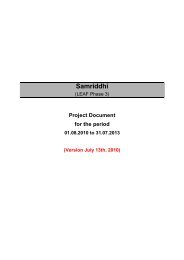swiss cooperation strategy for mongolia 2007-2012 - Deza - admin.ch
swiss cooperation strategy for mongolia 2007-2012 - Deza - admin.ch
swiss cooperation strategy for mongolia 2007-2012 - Deza - admin.ch
Create successful ePaper yourself
Turn your PDF publications into a flip-book with our unique Google optimized e-Paper software.
SWISS COOPERATION STRATEGY FOR MONGOLIA <strong>2007</strong>-<strong>2012</strong><br />
Foreword<br />
As one of the first countries of the West, Switzerland<br />
established diplomatic relations with Mongolia in<br />
1964. At that time Mongolia was strongly dependent<br />
on the Soviet Union and the COMMECON. With<br />
the collapse of its patron Mongolia embarked on<br />
a fast transition from a socialist regime to market<br />
economy based on democratic principles and<br />
ideologically underpinned by the legacy of Chinggis<br />
Khan. The leader of the last Millennium who once<br />
ruled the biggest ever empire from India to Europe<br />
inspired this transition of Mongolia from a supplier<br />
of raw materials to the Soviet Union to a global<br />
actor, vigilant about maintaining good relations<br />
with its two big neighbors, Russia and China, while<br />
cultivating relations with ‘third neighbors’. This<br />
terms stands <strong>for</strong> all other countries Mongolia has<br />
friendly political and economic relations with.<br />
Driven by a neo-liberal market economy theory,<br />
the Government of Mongolia first reduced the<br />
public financing of basic services, su<strong>ch</strong> as health,<br />
education, and agriculture, leaving vulnerable<br />
people and enterprises with little protection. With<br />
significant assistance from various donors, led by<br />
the Government of Japan, poverty was contained<br />
at 36% <strong>for</strong> the last years. Mongolia now stands<br />
at a critical stage of development, with the<br />
enormous potential of its mineral resources on the<br />
one side, stagnant poverty and corruption, and<br />
high unemployment on the other. To address the<br />
<strong>ch</strong>allenges of equitable economic development,<br />
sustainable management of natural resources,<br />
and governance, long-term strategic thinking and<br />
investments will have to replace the focus on shortterm<br />
economic and political benefits. In rural areas,<br />
limited access to goods and transport and missing<br />
alternatives to herding hamper rural development<br />
and fuel rural-urban migration.<br />
of Mongolia. Realizing that structural weaknesses<br />
may have worsened the impact of the dzuds, the<br />
decision <strong>for</strong> a longer term SDC involvement was<br />
made. The Swiss Cooperation Strategy (SCS) <strong>for</strong><br />
Mongolia was developed with active participation<br />
of key national and international stakeholders in<br />
Mongolia. These stakeholders assessed the present<br />
situation, analyzed past experiences, drew lessons<br />
learnt, developed possible scenarios, set strategic<br />
objectives and proposed concrete SDC contributions<br />
to country outcomes. The global shift towards a<br />
stronger and shared per<strong>for</strong>mance orientation in<br />
international development influenced the structure<br />
of Swiss Support. It is aligned to the Government<br />
of Mongolia’s development goals clearly guiding<br />
and stating SDC’s program contributions to the<br />
Mongolian priorities. The <strong>for</strong>mat of the <strong>strategy</strong><br />
proposes a common language, <strong>for</strong>mat and logic<br />
whi<strong>ch</strong> shall contribute to enhance per<strong>for</strong>mance,<br />
both in terms of the effectiveness of its development<br />
programs and its organizational effectiveness.<br />
Explicit ef<strong>for</strong>ts are made to define and monitor<br />
program management per<strong>for</strong>mance to meet the<br />
ultimate purpose of delivering development results.<br />
The <strong>strategy</strong> is designed to be a transparent tool of<br />
result based management facilitating harmonization<br />
with other initiatives in Mongolia and will guide<br />
Swiss involvement in Mongolia <strong>for</strong> the period<br />
<strong>2007</strong>-<strong>2012</strong>. Within this period the SDC Mongolia<br />
program will grow progressively rea<strong>ch</strong>ing 9 million<br />
CHF SDC per year in 2009.<br />
Walter Fust, Ambassador<br />
SDC Director-General<br />
Mongolia prioritizes human development with<br />
a focus on poverty and unemployment reduction,<br />
avoiding harmful impact on the environment and<br />
strengthening the resilience of the herders towards<br />
natural disasters. Switzerland partners with Mongolia<br />
in its ef<strong>for</strong>ts to rea<strong>ch</strong> these goals as stated in the<br />
Mongolian National Development Strategy.<br />
Initially, the Swiss Agency <strong>for</strong> Development and<br />
Cooperation (SDC) successfully supported dzud 1<br />
victims through humanitarian aid programs in<br />
Western Mongolia, responding to an international<br />
appeal in 2001 by the UN and the Government<br />
1 Natural disaster: dry summers followed by extremely cold winters led to<br />
the death of millions of animals, whi<strong>ch</strong> underfed, could not survive the cold<br />
winters. The consequence was that many herders lost a large part of the herd,<br />
the basis <strong>for</strong> their livelihood, and were driven into poverty.<br />
4

















